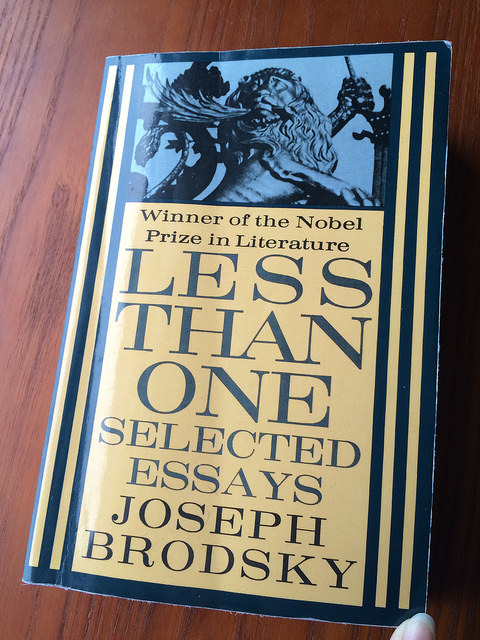
A Love Letter to Joseph Brodsky

Less Than One – Joseph Brodsky
Lately, I’ve been talking a lot with one of my writing friends about being fearless in writing. Being fearless doesn’t necessarily mean tackling difficult or painful topics (though it might), but instead a willingness to play on the page and see where the prose takes you.
To someone like me who thrives on the merging of the analytical and the creative, sometimes it can be a challenge to turn the left side of my brain down a notch and allow the right to take me away.
Something I’ve noticed from nearly every writer who has come to Columbia College Chicago to graciously give their time in Q&A sessions with our grad students and/or public readings is that each and every one of them stresses the fact that the more you write and the more you learn about your craft the harder it gets. It seems like it should be the opposite, right? Hear me out though—the more you learn about the craft of writing, all of the masters who preceded you sitting down at you desk and typing/penning that first word, the more you learn about the great traditions of literature within this country, the more you learn about the literary traditions of the world, you come to learn how little you truly know.
In order to expand your world, first you must shrink it down to size.
One of the greatest gifts of my grad program (so far) would have to be simply the fact that I have been assigned such a wide range of writers that span genre, time, and place—writers that I had never gotten a chance to read and in some cases never even heard of.

World Covered in White
For the past four or so weeks, I’ve been reading the prose of Joseph Brodsky. One of my classmates described the experience of reading Brodsky perfectly: “I didn’t know how hungry I was.”
In our current literary and MFA landscape, I think it’s frightfully easy to become pigeon-holed into reading certain types of writers. Brodsky, typically known as a poet, is a writer whose prose I likely would not have found on my own (huge thanks to Aviya Kushner and her Prose Models by Poets class!), but one who I feel has become essential to my mindset as a writer.
Brodsky has a boldness and fearlessness and a generosity in his writing that I didn’t realize I was missing. He covers topics that range from his youth in St. Petersburg to great Russian poets Anna Akhmatova and Marina Tsvetaeva to writers of other countries including W.H. Auden, Derek Walcott, and Constantine Cavafy. His essays are so deeply generous to the writers he admires, demonstrating not just admiration for their work but his intense love for literature and language. Through the ways in which Brodsky shares insights on a wide range of universal topics such as the nature of oppression, poetry, and love, we learn who he is as a writer and a human.
In “On ‘September 1, 1939’ by W. H. Auden” he writes:
“Uncertain and afraid” [referring to the text of Auden’s poem] denotes what?—doubt. And this is precisely where this poem—indeed poetry in general, art in general—starts for real: in or with doubt.
Brodsky does not fear the infinite, but strives to do it justice through composing love letters in the form of essays to writers, their work, and writing itself. Instead of being uncertain if he is qualified to write on the infinite, to offer his opinion boldly on universal and timeless topics, he reaches towards infinity in order to share and more importantly, to preserve.
“Because civilizations are finite, in the life of each of them comes a moment when centers cease to hold. What keeps them at such times from disintegration is not legions, but languages.”
